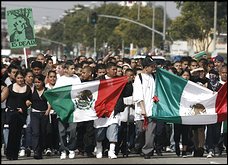
Immigration Posturing
Perception in politics is everything. So the posturing to be perceived as having the most tolerable view by a representative’s constituents is of political necessity. This is not to say there is no earnestness in our representatives to do what’s right. Currently there are at least seven (7) major bills - http://www.immigrationreformnow.org/immigrationreformnow/Bills.htm - on immigration being introduced, or to be, in senate or house. First, some facts as presented by this website about border control cost at: http://kennedy.senate.gov/~kennedy/statements/06/03/2006317B48.html:
- In 1986, the budget for the Border Patrol was $151 million. By 2002, the Border Patrol budget had reached $1.6 billion—a tenfold increase.
- By 2002 the Border Patrol was the largest arms-bearing branch of the U.S. government, excluding the military.
- Building a fence along the entire southwest border would cost roughly $9 billion—about $2.5 billion more than the total budget of U.S. Customs and Border Protection in FY 2005.
As Paul Krugman wrote today in the NY Times: “Basic decency requires that we provide immigrants, once they're here, with essential health care, education for their children, and more. As the Swiss writer Max Frisch wrote about his own country's experience with immigration, "We wanted a labor force, but human beings came." Unfortunately, low-skill immigrants don't pay enough taxes to cover the cost of the benefits they receive.”
As many as 12,000,000 illegal Hispanics reside in the US, and in the NC alone (since 1990 one of the fastest Hispanic growth states), according to a N&O report today, half of the 600,000 Hispanic population may be illegal. http://www.rnha.org/Demographics.htm: As of 2004, Hispanics make 14% of U. S. population, exceeding the 12% by blacks. Hispanics native--born in US make up 7.7% of US population. There are 8,416,000 Hispanic children in our schools, k-12.
On a personal level I don’t know many Hispanics, but I do know they are an imperative economic workforce in our county, state and nation. Without their labors my brothers and nephew who operate row-crops, turkey, and hog productions would have found it very difficult to operate without Hispanic services. They are essential for farm production that is required to survive in today’s agriculture economy throughout America. The same is true of many businesses throughout our nation.
Hispanics are not culturally assimilated in our society and probably never will be completely. My church and other community churches give facilities for their congregations to worship. These are at least symbolic goodwill gestures to welcome an isolated society to become more engaged as equals. Perhaps we could and should do more.
Yes, I think we do owe immigrants something, whether they are legal or illegal, for our system to incorporate them legally has failed miserably; moreover our businesses’ economic needs have too many times welcomed the infiltration of an illegal workforce. Failure to deal with those problems at the point of occurrence was tantamount to approving of their entry into the country. There is no turning back the tide after it has washed over the banks, so it’s inevitable we’ll keep the legal immigrants and current illegal workforce as well. Hispanics masses marched today in LA, Detroit, and other places for their rights. According to the following web page, even Irish lobbyists, part of an effort organized by the Irish Lobby for Immigration Reform (ILIR), have recently petitioned our government, using Irish government money to do it. http://www.alipac.us/article-print-1102.html: “The Irish government has launched an all-out effort for the McCain-Kennedy immigration bill because it would grant amnesty to illegal aliens in the U.S. by converting them into legal guest workers. Funding ILIR is part of Ireland’s pro-McCain-Kennedy campaign.”
The mass exodus from Mexican borders, as I see it, in reality is part of the economic globalization that Thomas Friedman so proficiently researched in his book, “The World Is Flat”. To quote Friedman, paraphrased: “My parents told me to clean my plate. There are people starving for your food. I tell my daughters, get an education, there are people in China starving for your jobs.” Without question some jobs are being lost to immigrants, but for the most part it’s not about low wages. The greater negative (and some positive) impact may be economic globalization resulting in outsourcing of labor and industrial manufacturing to countries other than Mexico.
As I write this my church friend, Bob Dickens, is now visiting China to drum up business, another sign that “The World Is Flat”. To quote again from it: “If Wal-Mart was an individual economy, it would rank as China’s eight-biggest trading partner, ahead of Russia, Australia and Canada.” So maybe the best we can hope for is for our children and grandchildren is to be educated and skilled to the top of their game. For they will inevitably, I believe in general, have a lower standard of living than our generation has enjoyed. As Friedman’s book points out, Math and Science advances are critical to maintaining America’s economic global leadership. That’s the only protectionism that will work for our American dream society.
Immigrants, who are without criminal orientation/record and have earned equitable-work status, with an appropriate procedure should be incorporated as citizens now – or later in a legalized guest-worker program that includes a clear route to citizenship. Families that are together in this country should preclude sending money back to Mexico. Full responsibility to pay taxes and earn benefits expected, as other Americans, will benefit society in multiple ways.
More perspectives on immigration, informative articles on in today’s papers:
Help Wanted as Immigration Faces Overhaul Washington Post: http://www.washingtonpost.com/wp-dyn/content/article/2006/03/26/AR2006032601058.html?referrer=email&referrer=email
March 27, 2006
Op-Ed Columnist
North of the Border
By PAUL KRUGMAN http://select.nytimes.com/2006/03/27/opinion/27krugman.html?th&emc=th
"Give me your tired, your poor, your huddled masses yearning to breathe free," wrote Emma Lazarus, in a poem that still puts a lump in my throat. I'm proud of America's immigrant history, and grateful that the door was open when my grandparents fled Russia.
In other words, I'm instinctively, emotionally pro-immigration. But a review of serious, nonpartisan research reveals some uncomfortable facts about the economics of modern immigration, and immigration from Mexico in particular. If people like me are going to respond effectively to anti-immigrant demagogues, we have to acknowledge those facts.
First, the net benefits to the U.S. economy from immigration, aside from the large gains to the immigrants themselves, are small. Realistic estimates suggest that immigration since 1980 has raised the total income of native-born Americans by no more than a fraction of 1 percent.
Second, while immigration may have raised overall income slightly, many of the worst-off native-born Americans are hurt by immigration — especially immigration from Mexico. Because Mexican immigrants have much less education than the average U.S. worker, they increase the supply of less-skilled labor, driving down the wages of the worst-paid Americans. The most authoritative recent study of this effect, by George Borjas and Lawrence Katz of Harvard, estimates that U.S. high school dropouts would earn as much as 8 percent more if it weren't for Mexican immigration.
That's why it's intellectually dishonest to say, as President Bush does, that immigrants do "jobs that Americans will not do." The willingness of Americans to do a job depends on how much that job pays — and the reason some jobs pay too little to attract native-born Americans is competition from poorly paid immigrants.
Finally, modern America is a welfare state, even if our social safety net has more holes in it than it should — and low-skill immigrants threaten to unravel that safety net.
Basic decency requires that we provide immigrants, once they're here, with essential health care, education for their children, and more. As the Swiss writer Max Frisch wrote about his own country's experience with immigration, "We wanted a labor force, but human beings came." Unfortunately, low-skill immigrants don't pay enough taxes to cover the cost of the benefits they receive.
Worse yet, immigration penalizes governments that act humanely. Immigrants are a much more serious fiscal problem in California than in Texas, which treats the poor and unlucky harshly, regardless of where they were born.
We shouldn't exaggerate these problems. Mexican immigration, says the Borjas-Katz study, has played only a "modest role" in growing U.S. inequality. And the political threat that low-skill immigration poses to the welfare state is more serious than the fiscal threat: the disastrous Medicare drug bill alone does far more to undermine the finances of our social insurance system than the whole burden of dealing with illegal immigrants.
But modest problems are still real problems, and immigration is becoming a major political issue. What are we going to do about it?
Realistically, we'll need to reduce the inflow of low-skill immigrants. Mainly that means better controls on illegal immigration. But the harsh anti-immigration legislation passed by the House, which has led to huge protests — legislation that would, among other things, make it a criminal act to provide an illegal immigrant with medical care — is simply immoral.
Meanwhile, Mr. Bush's plan for a "guest worker" program is clearly designed by and for corporate interests, who'd love to have a low-wage work force that couldn't vote. Not only is it deeply un-American; it does nothing to reduce the adverse effect of immigration on wages. And because guest workers would face the prospect of deportation after a few years, they would have no incentive to become integrated into our society.
What about a guest-worker program that includes a clearer route to citizenship? I'd still be careful. Whatever the bill's intentions, it could all too easily end up having the same effect as the Bush plan in practice — that is, it could create a permanent underclass of disenfranchised workers.
We need to do something about immigration, and soon. But I'd rather see Congress fail to agree on anything this year than have it rush into ill-considered legislation that betrays our moral and democratic principles.

